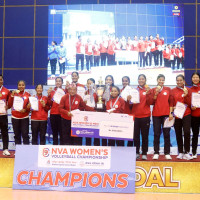- Sunday, 4 January 2026
Musings Of An Accomplished Litterateur-Diplomat
Hari Kumar Shrestha is a career diplomat with a proven background in the literary bent of mind with solid expertise in terms of travelogues. This is his third publication after two equally best sellers, ABIRAL YATRA (Unbroken Journey) and MAITRI EKSPRES (Friendly Express), that he wrote during service days.
The new title, NOSTAALJIYA (Nostalgia) which the author has preferred to translate as Reflections & Recollections, has an eye-catching front cover depicting picturesque Rara Lake that prompted King Mahendra to write in its appreciation. As the writer has indicated in the Preface, the work that faced delays on account of the COVID-19 pandemic is a joint venture of the couple. The book justifiably carries an equally captivating picture of the couple (Hari Kumar Shrestha and Shakuntala Shrestha) on its back. Understandably, quite a significant portion of the work relates to feelings, frustrations, contributions and reflections of the best half of the writer with deservedly fulsome presence and recognition given to her as diplomatic wives were taken by the father of foreign service of a neighbouring country as full-fledged foreign service officials sans names in the monthly payslips.
One senior journalist, Dhruba Hari Adhikary expresses surprise at the way the title was borrowed from English, even giving its Nepali translation quoting a dictionary compiled by first Foreign Secretary Narendra Mani Acharya Dixit. Another learned colleague, Ambassador Rudra Kumar Nepal, has learnt to have consulted almost a dozen dictionaries to decipher the meaning that normally refers to sentimental longing or yearning for experience.
The book is written in simple language with facets of romance, suspense and personal experience involving both comedy and tragedy that he underwent before and after joining Foreign Service. The highly readable work that Hari Kumar Shrestha likes to summarize as a veritable saga of ups and downs or upheavals that the couple confronted especially for the last four decades, has also familiar tryst with diplomacy and various actors involved, many diplomatic but even others, that they came across in course of their long innings in public life.
Despite his penchant to call his work a cocktail offering different tastes, it is a judicious amalgam of deep knowledge, exemplary writing skill and valuable information perched in a matter-of-fact style conveying deeper meaning. Another close colleague, Ambassador Ramesh Prasad Khanal, has stated that the book is a mine of information, both diplomatic and non-diplomatic, relating to his educational pursuits and various constraints in the family, and reading between the lines, pangs, trials, tribulations and even ostracizations that a Nepali career diplomat is forced to confront. The book is divided into 26 chapters with the first 3 primarily dealing with his experience before joining the service.
The next 12 chapters are related to practical tryst with various aspects of diplomacy but also incorporate things that are outside its ambit. At least two chapters, 9th and 10th, are related to periods after superannuation. The last 11 chapters deal with post-retirement reflections. As a direct witness to his exemplary work at headquarters as a colleague and supervisor in the capacity of Foreign Secretary, I count Shrestha among some select officers of our comparatively small Foreign Service in terms of efficiency, dedication and hard work, and do not doubt that I would have badly failed in my capacity as numero uno of the service in the absence of their support and cooperation.
Starting his service as an officer of Agricultural Inputs Corporation, Shrestha joined Foreign Service in 1983 and served at headquarters and missions for over three decades with distinction and acclaim. At least two people whom he came across during his short-lived National Development Service stint that a post-graduate student was supposed to complete in between his academic schedules but abruptly scrapped in 1979, rose to eminence. Leela Mani Pokhrel, a fellow participant in the programme, is now a senior leftist leader and Thakur Prasad Gyawali, whom he taught, joined the police service and retired as Inspector-General.
With earlier postings in Moscow, London and Kuala Lumpur, Shrestha retired as Ambassador to Bangladesh in 2016. His commitment and tenacity of purpose have been duly testified by his contributions in terms of assisting the country in the wake of the mega earthquake of April 25, 2015. With diplomatic training from Berlin, Shrestha is a tested hand in South Asia and SAARC and holds a positive assessment of Foreign Minister Shailendra Kumar Upadhyaya.
The couple seem to have found warmth in both cold places, Moscow which was in the throes of great change from unmanageably corrupt Communist control to a more open but difficult transition, and London, but find the seemingly new urban architecture of Kuala Lampur a bit out of sync. They enjoyed their terminal posting as ambassadors in Dhaka, finding it more comfortable despite inclement weather.
On more personal grounds, I am grateful to the author for mentioning my name and position on issues as we worked closely in Kathmandu and during limited visits abroad. From the perspective of this book alone, we share at least four common factors, longer innings in South Asia-SAARC divisions at headquarters and postings in Bangladesh, departure to respective stations to assume ambassadorship on the same day (Shrestha for Dhaka and myself for Tokyo), common appreciation of Shanta alias Ambassador Dr Singha Bahadur Basnyat, Khuswant Singh and Professor Rajendra Subedi, and, last not least, a weakness for products of Pawan sweets outlet, Bhairhawa. It is noteworthy that the author has dedicated full obituaries to Dr Basnyat, his teacher Parsuram Shrestha and Rajendra Subedi. One lacuna of the otherwise most welcome publications is that it has proof mistakes in some places, which could have been avoided. We are sure this is not the end of his writing-spree as the author is eminently qualified to bring more volumes on this aspect as reflections and remembrances of his long public life. We congratulate both Hari Kumar Shrestha and Madam Shakuntala Shrestha on their great endeavour.















